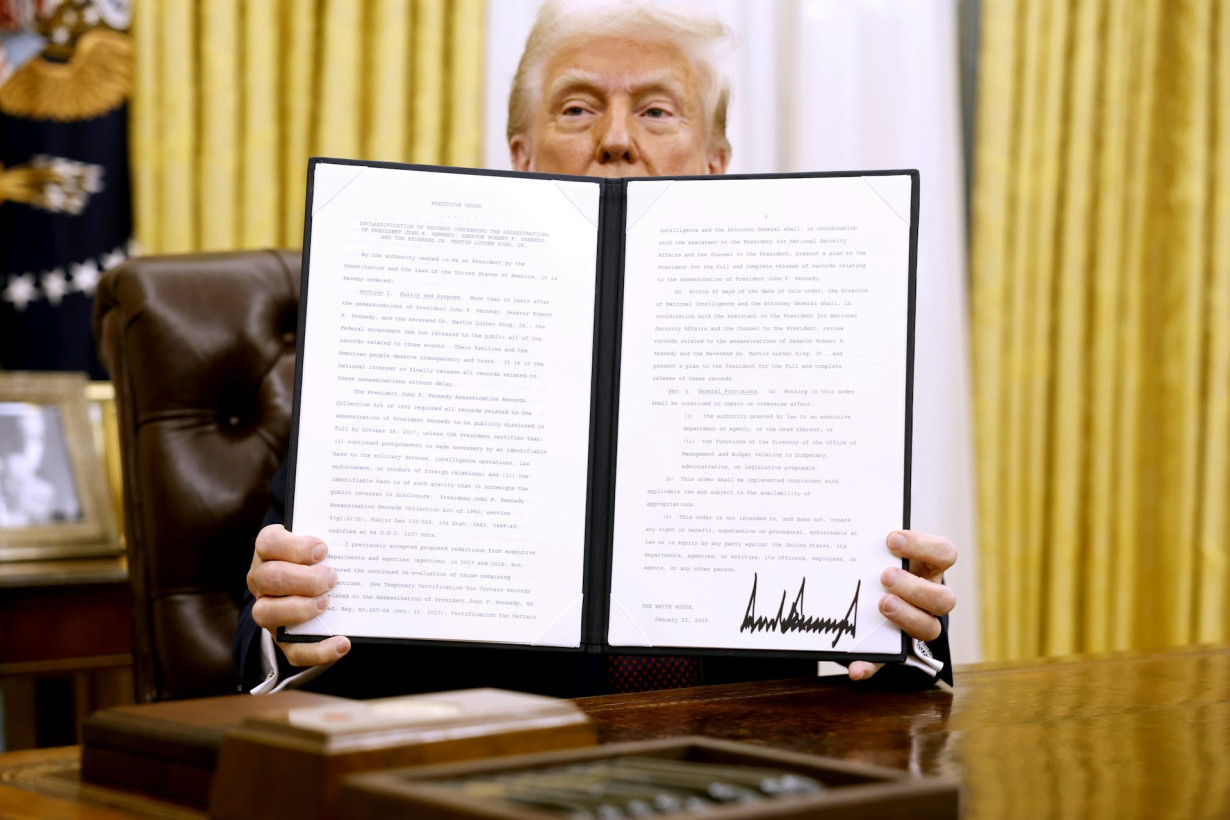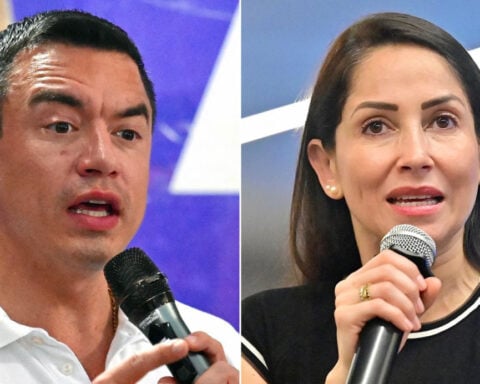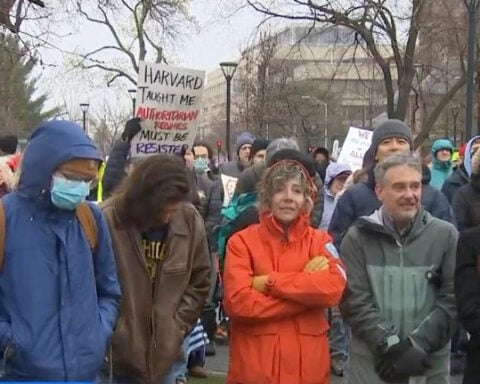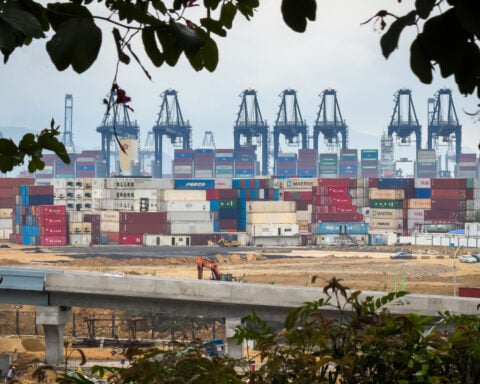If you think a lot is happening in the federal government all at once on a lot of different issues, you’re right.
At the beginning of a new presidential administration, there is often a flurry of changes – new Cabinet appointments and a few executive orders. But what’s happening right now in Washington, D.C. – actions affecting immigration, tariffs, the firing of career government workers, gender identity, federally funded research, foreign aid and even broader categories of federal spending – is different from most presidential transitions, in volume, pace, content and breadth of the changes ordered.
Administration officials and Trump allies have described all this action as a “shock and awe” campaign intended to “flood the zone.” Translation: It’s both an effort to demonstrate autocratic power and an effort to overwhelm and exhaust people who might resist the changes.
The Conversation U.S. has published several articles – many from Donald Trump’s first term as president – that spell out how autocrats, and those who want to be autocrats, behave and why. Here are some key points to know.
1. Seize executive power
The move toward autocracy starts with wielding unyielding power over not only people but democratic institutions, explained Shelley Inglis, a scholar of international law at the University of Dayton. In a checklist of 10 items for wannabe authoritarians, the first task, she wrote, is being strong:
“The mainstay of today’s authoritarianism is strengthening your power while simultaneously weakening government institutions, such as parliaments and judiciaries, that provide checks and balances. The key is to use legal means that ultimately give democratic legitimacy to the power grab.”
Read more: So you want to be an autocrat? Here's the 10-point checklist
2. Control political backers
When a leader’s supporters are more loyal to the person than their political party, that creates what is called a “personalist party,” as scholars of political science Erica Frantz at Michigan State University, Joe Wright at Penn State and Andrea Kendall-Taylor at Yale University described. That creates a danger to democracy, they wrote:
“(W)hat matters for democracy is not so much the ambitions of power-hungry leaders, but rather whether those in their support group will tame them. … (W)hen personalist ruling parties hold legislative majorities and the presidency … there is little that stands in the way of a grab for power.”
Read more: Why Trump's control of the Republican Party is bad for democracy
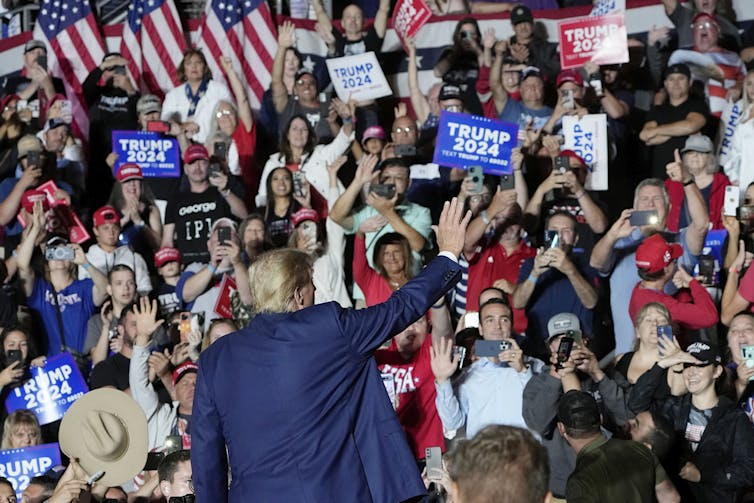
Many Republican Party members back Trump, in part because other party leaders signal their own support.
3. Sideline the public
In a democracy, the public has power. But if the people choose not to exercise it, that leaves room for an authoritarian leader to take more control, warned Mark Satta, a professor of philosophy and law at Wayne State University in an article comparing George Orwell’s book “Nineteen eighty-four” to modern events:
“Trump routinely speaks like an autocrat. Yet many Americans excuse such talk, failing to treat it as the evidence of a threat to democracy that it is. This seems to me to be driven in part by the tendency Orwell identified to think that truly bad things won’t happen – at least not in one’s own country.”
Read more: Nationalism is not patriotism: 3 insights from Orwell about Trump and the 2024 election

Donald Trump hugs an American flag as he arrives at the Conservative Political Action Conference on Feb. 24, 2024, in Baltimore.
4. Depend on complacency
Another scholar delivered a warning of a possible future. Vickie Sullivan, a political science scholar at Tufts University, studies Renaissance writer Niccolò Machiavelli, who lived from 1469 to 1527.
He is perhaps most widely known for encouraging “sole rulers – his phrase for authoritarians or dictators – … to use force and fraud to gain and maintain power,” she wrote. But Machiavelli had advice for the public, too, Sullivan explained:
“He instructs republican citizens and leaders … to recognize how vulnerable the governments they cherish are and to be vigilant against the threats of tyranny. … If republican citizens and leaders fail to be vigilant, they will eventually be confronted with a leader who has accumulated an extremely powerful and threatening following. At that point, Machiavelli says, it will be too late to save the republic.”
This story is a roundup of articles from The Conversation’s archives.

Source: The Conversation

 Trump has begun another trade war. Here's a timeline of how we got here
Trump has begun another trade war. Here's a timeline of how we got here
 Canada's leader laments lost friendship with US in town that sheltered stranded Americans after 9/11
Canada's leader laments lost friendship with US in town that sheltered stranded Americans after 9/11
 Chinese EV giant BYD's fourth-quarter profit leaps 73%
Chinese EV giant BYD's fourth-quarter profit leaps 73%
 You're an American in another land? Prepare to talk about the why and how of Trump 2.0
You're an American in another land? Prepare to talk about the why and how of Trump 2.0
 Chalk talk: Star power, top teams and No. 5 seeds headline the women's March Madness Sweet 16
Chalk talk: Star power, top teams and No. 5 seeds headline the women's March Madness Sweet 16
 Purdue returns to Sweet 16 with 76-62 win over McNeese in March Madness
Purdue returns to Sweet 16 with 76-62 win over McNeese in March Madness
